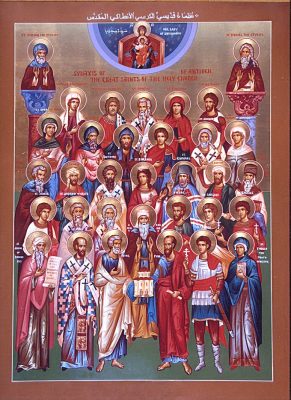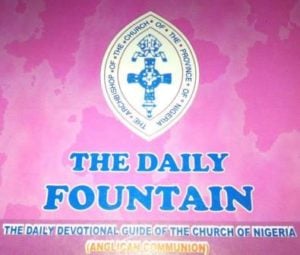Liturgical Readings for : Wednesday, 24th April, 2024
Wednesday of the Fourth Week of Easter
Optional memorial of St Fidelis of Sigmaringen, priest and martyr
FIRST READING

A reading from the Acts of the Apostles 12:24-13:5
Set Barnabas and Saul apart.
The word of God continued to spread and to gain followers. Barnabas and Saul completed their task and came back from Jerusalem, bringing John Mark with them.
In the church at Antioch the following were prophets and teachers: Barnabas, Simeon called Niger, and Lucius of Cyrene, Manaen, who had been brought up with Herod the tetrarch, and Saul. One day while they were offering worship to the Lord and keeping a fast, the Holy Spirit said,
‘I want Barnabas and Saul set apart for the work to which I have called them.‘
So it was that after fasting and prayer they laid their hands on them and sent them off.
So these two, sent on their mission by the Holy Spirit, went down to Seleucia and from there sailed to Cyprus. They landed at Salamis and proclaimed the word of God in the synagogues of the Jews; John acted as their assistant.
The Word of the Lord. Thanks be to God
Responsorial Psalm Ps 66
Response Let the peoples praise you, O God; let all the peoples praise you.
1. O God, be gracious and bless us and let your face shed its light upon us.
So will your ways be known upon earth and all nations learn your saving help. Response
2. Let the nations be glad and exult for you rule the world with justice.
With fairness you rule the peoples, you guide the nations on earth. Response
3. Let the peoples praise you, O God; let all the peoples praise you.
May God still give us his blessing till the ends of the earth revere him. Response
Gospel Acclamation Jn 20: 29
Alleluia, alleluia!
I am the good shepherd, says the Lord, I know my sheep and my own know me.
Alleluia!
Or Jn 8: 12
Alleluia, alleluia!
‘You believe, Thomas, because you can see me.
Happy are those who have not seen and yet believe.’
Alleluia!
GOSPEL
The Lord be with you. And with your spirit
A reading from the Gospel according to John 12:44-50 Glory to you, O Lord
I, the light, have come into the world.

Jesus declared publicly:
‘Whoever believes in me believes not in me but in the one who sent me,
and whoever sees me, sees the one who sent me.
I, the light, have come into the world, so that whoever believes in me
need not stay in the dark any more.
If anyone hears my words and does not keep them faithfully, it is not I who shall condemn him, since I have come not to condemn the world, but to save the world: he who rejects me and refuses my words has his judge already:
the word itself that I have spoken will be his judge on the last day.
For what I have spoken does not come from myself; no, what I was to say, what I had to speak, I was commanded by the Father who sent me,
and I know that his commands mean eternal life. And therefore what the Father has told me is what I speak.’
The Gospel of the Lord. Praise to you, Lord Jesus Christ
____________________________
Gospel Reflection Wednesday Fourth Week of Easter John 12:44-50
In today’s gospel reading Jesus refers to ‘the Father who sent me’. In the fourth gospel Jesus is the ‘sent one’. One of the most memorable verses of this gospel declares, ‘God did not send the Son into the world to condemn the world, but in order that the world might be saved through him’. Jesus personalizes this statement in today’s gospel reading, ‘I have come not to condemn the world but to save the world’. In the language of the fourth gospel, God sent his Son into the world so that we may have life and have it to the full. There is another sending in today’s first reading.
The church in Antioch, under the guidance of the Holy Spirit, sent two of their leading members, Barnabas and Saul, on mission to places where the gospel had not been preached, resulting in the expansion of the gospel westwards. This was a costly sending, because Barnabas and Saul had been central to the life of the church in Antioch. God’s sending of his Son into the world was also costly because it entailed a giving of his Son over to death, death on a cross. Yet, both the sending of Jesus and the sending of Barnabas and Saul were life-giving for those to whom they were sent. This is supremely true of the sending of Jesus, without which there would have been no sending of Barnabas or Saul. The church in every age is called to send, to let go of precious resources, so that others may flourish. The dynamic of sending is vital today as parishes learn to journey together, sharing resources, learning to become poor so that others may become rich, and, in the process, discovering that all are enriched.
__________________________________
The Scripture Readings are taken from The Jerusalem Bible, published 1966 by Darton, Longman & Todd Ltd.







![#KingdompadiMusicVid: James Akinwumi | Our God [@MinisterjamesOF]](https://www.kingdompadi.com/wp-content/uploads/2025/03/WhatsApp-Image-2025-03-03-at-15.05.04_acb15277-150x150.jpg)





